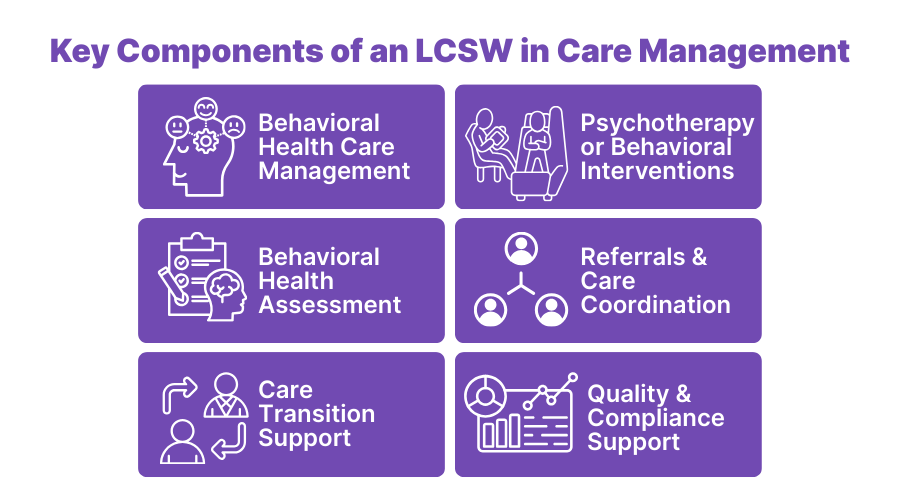What is a Licensed Clinical Social Worker (LCSW) in Healthcare?
A Licensed Clinical Social Worker (LCSW) is a credentialed mental health provider trained to assess, diagnose, and treat behavioral, emotional, and social conditions. LCSWs hold a master’s degree in social work (MSW), are licensed by a state board, and are qualified to provide care in medical, behavioral health, and community-based settings.
In healthcare organizations, LCSWs are often embedded in care teams that manage patients with chronic illness, mental health conditions, or complex social needs. While an LCSW is not typically recognized as a billing provider under Medicare’s care management codes, they are frequently involved in delivering services within programs such as the Collaborative Care Model (CoCM) and Behavioral Health Integration (BHI). In these cases, the LCSW often serves as the Behavioral Health Care Manager (BHCM) under the supervision of a Qualified Health Professional (QHP) or prescribing provider.

Key Functions of an LCSW in Care Management
Licensed Clinical Social Workers are essential members of interdisciplinary care teams, especially in primary care and behavioral health integration models. While they typically do not bill Medicare directly for care management services, LCSWs often fulfill critical non-physician roles under appropriate supervision.
Common functions of an LCSW in CMS-recognized care models include:
- Acting as the Behavioral Health Care Manager (BHCM) in the Collaborative Care Model (CoCM)
- Delivering structured psychotherapy or behavioral interventions as part of a care plan
- Conducting assessments and documenting behavioral health conditions
- Coordinating referrals, community services, and patient follow-up
- Supporting transitions of care in programs like TCM or PCM
- Assisting in quality reporting, HEDIS documentation, or CMS compliance workflows
LCSWs are especially valuable in rural or underserved areas where behavioral health access is limited, and they often serve as the primary point of contact for patients navigating complex mental health or social challenges.
Who Qualifies as a LCSW?
To be licensed as an LCSW, a provider must complete advanced clinical training and meet all state-level requirements for independent practice. Although credentialing standards vary slightly by jurisdiction, the core qualifications are generally consistent across the U.S.
Most states require that an LCSW must:
- Hold a Master of Social Work (MSW) from an accredited program
- Complete 2,000–4,000 hours of supervised clinical experience
- Pass the ASWB Clinical Exam
- Maintain ongoing continuing education for license renewal
LCSWs are authorized to deliver clinical services including psychotherapy, mental health assessments, and care coordination. However, whether an LCSW qualifies as a billing provider under CMS or commercial payer programs depends on the context. In most Medicare care management programs, LCSWs may participate in care delivery but must work under the supervision of a credentialed QHP or billing clinician.
Billing and Eligibility for LCSWs in Medicare and Care Management Programs
Licensed Clinical Social Workers are recognized by CMS as mental health professionals, but they are not always eligible to bill directly for care management services. Their ability to participate in programs like CoCM, CCM, or PCM depends on program structure, supervision rules, and the role they play in the care team.
When LCSWs can bill Medicare directly:
- For individual psychotherapy or mental health evaluations (e.g., CPT 90832–90837)
- When enrolled as independent providers and credentialed with Medicare
When LCSWs typically cannot bill directly:
- For Chronic Care Management (CCM) or Principal Care Management (PCM) services
- When serving as a Behavioral Health Care Manager in CoCM — in these cases, the billing provider is typically a physician, NP, PA, or clinical psychologist
LCSW Supervision Requirements:
In care management models, LCSWs often function under the supervision of a Qualified Health Professional (QHP), who is responsible for reviewing documentation, signing off on care plans, and billing CMS.
To ensure compliance, practices should consult Medicare’s program-specific rules or payer-specific documentation to confirm how LCSWs may participate in care and whether their services qualify for reimbursement.
Frequently Asked Questions about LCSWs in Care Management
1. What is a Licensed Clinical Social Worker (LCSW)?
An LCSW is a licensed mental health provider with a master’s degree in social work, authorized to deliver clinical services such as psychotherapy, assessments, and care coordination. They are credentialed by state boards and often participate in integrated care teams.
2. Can an LCSW bill Medicare for care management services?
Not typically. LCSWs may bill Medicare for psychotherapy and behavioral health services, but care management codes like CCM, PCM, or CoCM must be billed by a Qualified Health Professional (QHP), not the LCSW.
3. What role does an LCSW play in the Collaborative Care Model (CoCM)?
LCSWs frequently serve as the Behavioral Health Care Manager (BHCM), delivering behavioral interventions, coordinating care, and tracking outcomes — but under the supervision of a billing provider like a psychiatrist, NP, or clinical psychologist.
4. Is an LCSW considered a QHP by CMS?
No. While LCSWs are licensed clinicians, they are not typically considered QHPs under CMS care management billing guidelines. They may deliver services, but cannot generally bill under time-based management codes.
5. What is the difference between an LCSW and a psychologist?
Psychologists hold a doctoral degree (PhD or PsyD) and may conduct testing and diagnostics. LCSWs hold a master’s degree and are focused more on therapy, care coordination, and patient support within behavioral health care teams.
